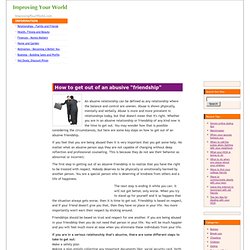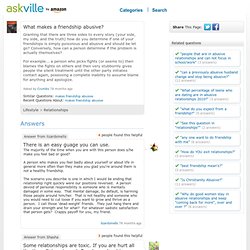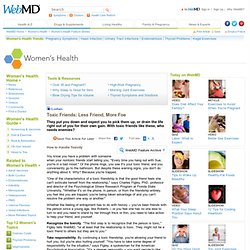

How to get out of an abusive "friendship": Relationships. An abusive relationship can be defined as any relationship where the balance and control are uneven.

Abuse is shown physically, mentally and verbally. Abuse is more and more prevalent in relationships today, but that doesn't mean that it's right. Whether you are in an abusive relationship or friendship of any kind now is the time to get out. You may wonder how that is possible considering the circumstances, but here are some key steps on how to get out of an abusive friendship. If you feel that you are being abused then it is very important that you get some help. The first step in getting out of an abusive friendship is to realize that you have the right to be treated with respect. The next step is ending it while you can.
Friendships should be based on trust and respect for one another. Are you in an abusive friendship? One of the most difficult side effects of an abusive friendship or relationship of any kind is the mental damage that is done to the victim. What makes a friendship abusive? Crumbs: There is a very common psychological tool used by insecure people known as "projection.

" What this means is, if you have a friend who picks fights/gets angry easily, the psychological way this is often dealt with internally is to "project" that behavior onto someone nearby, who is close to them. So the friend finds a way to blame you for the arguments that he/she always gets into. And because you are present during these encounters, its not entirely clear to you if you ARE to blame.
But whether you are involved or not, your friend now feels better because they have a way of looking at the situation and saying they didn’t cause it. I’ve mentioned one of my ex relationships in answers here on Askville, but I’ll go into it briefly again for your benefit. I’m a very laid back, tolerant, easy going and caring guy. She was a master of projection. I managed to keep this up for about two months before I realized that there really was nothing else I could take on that would please her. How do you recognize an emotionally abusive relationship?
Toxic Friendships: Do You Have One? They put you down and expect you to pick them up, or drain the life right out of you for their own gain.

With toxic friends like these, who needs enemies? Why do I need to register or sign in for WebMD to save? We will provide you with a dropdown of all your saved articles when you are registered and signed in. Elizabeth Roberts had a friend she'd known for 23 years. Roberts had grown up with this friend in a small town in Maine, and while longevity in a relationship often speaks to its strength, in her case, it was quite the opposite -- the older they got, the more the relationship turned toxic. "She was always putting me down," says Roberts. For Roberts, the friendship seemed OK, and she took the insults in stride. "I would mention to my mother or another friend something she said to me, and their responses were always, 'What? Continue reading below... What Is Toxic? "A friendship is between two peers," says Florence Isaacs, author of Toxic Friends/True Friends.
Toxic Friendships: Do You Have One? They put you down and expect you to pick them up, or drain the life right out of you for their own gain.

With toxic friends like these, who needs enemies? Why do I need to register or sign in for WebMD to save? We will provide you with a dropdown of all your saved articles when you are registered and signed in. How to Handle Toxicity You know you have a problem with someone when your nontoxic friends start telling you, "Every time you hang out with Sue, you're in a bad mood. " "One of the characteristics of a toxic friendship is that the good friend feels she can't extricate herself from the relationship," says Charles Figley, PhD, professor and director of the Psychological Stress Research Program at Florida State University. Recognize the toxicity. Take responsibility. Continue reading below... Set boundaries. Talk to your nontoxic friends. Suggest professional help.
End the friendship. Frightening Friendships: Abuse doesn’t only occur when dating «